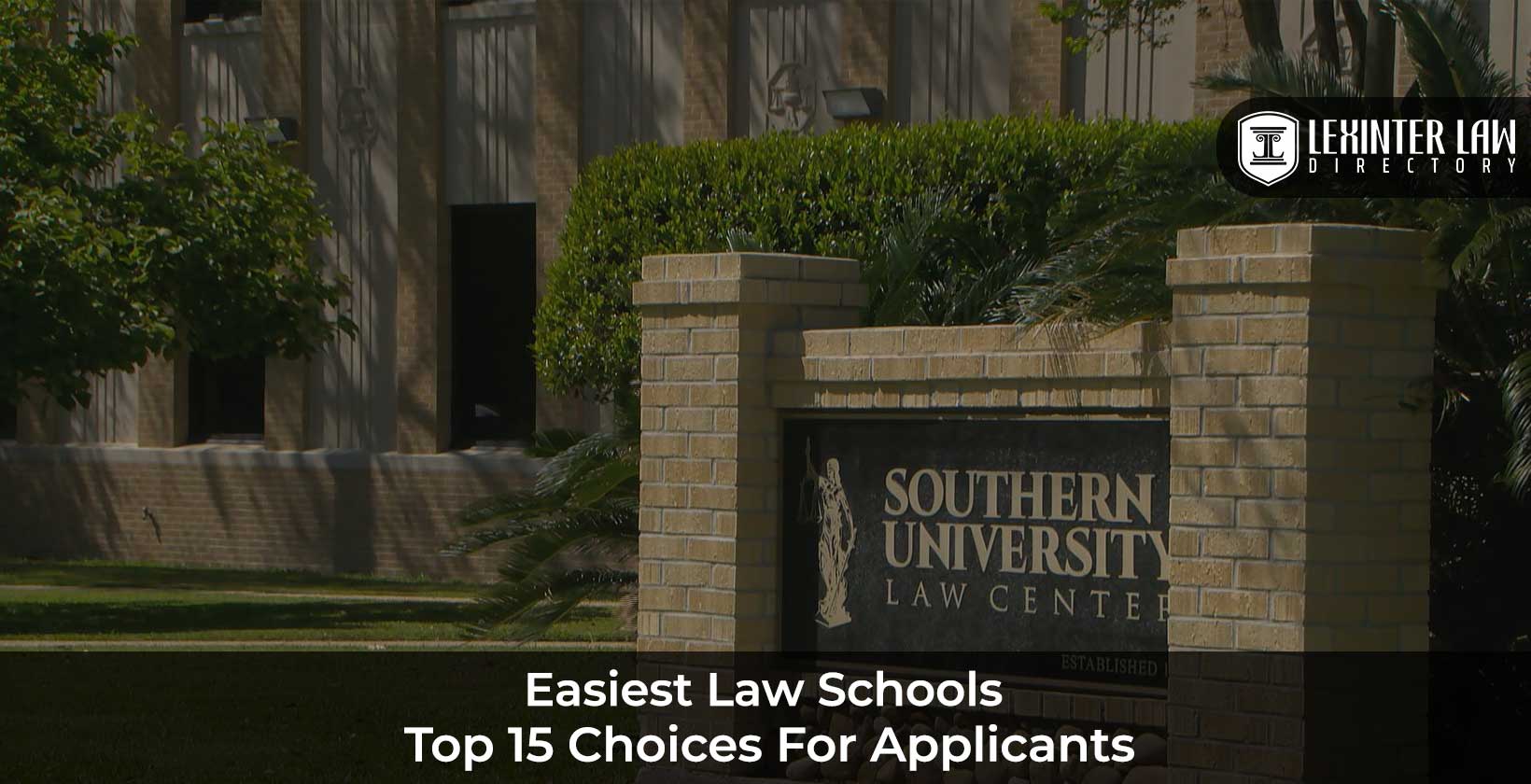Easiest Law Schools: Top 15 Choices For Applicants
15 easiest law schools to apply for offer prospective students an accessible path to legal education. Law schools with easy admission standards provide opportunities for individuals to pursue legal careers without facing overly stringent requirements. Southern University Law Center, for example, has a higher acceptance rate of 53.46%, making it an attractive choice for students seeking practical training and public service-oriented education. John Marshall Law School in Chicago ranks among the easiest law schools to get into, providing part-time and evening programs that cater to non-traditional students balancing education with other commitments. The institutions focus on offering practical experiences, such as internships and externships, allowing students to gain real-world legal skills.
The law schools help students by providing a supportive environment that fosters academic growth and practical experience. Schools with easy admission standards emphasize experiential learning, enabling students to engage in real-world legal cases through clinics and externships. A law school with easy admission ensures that students, even applicants without top academic credentials, develop valuable skills that prepare them for the legal profession. The institutions focus on public service and specialized fields, offering students a path to pursue meaningful legal careers while providing them with the tools needed for long-term success.
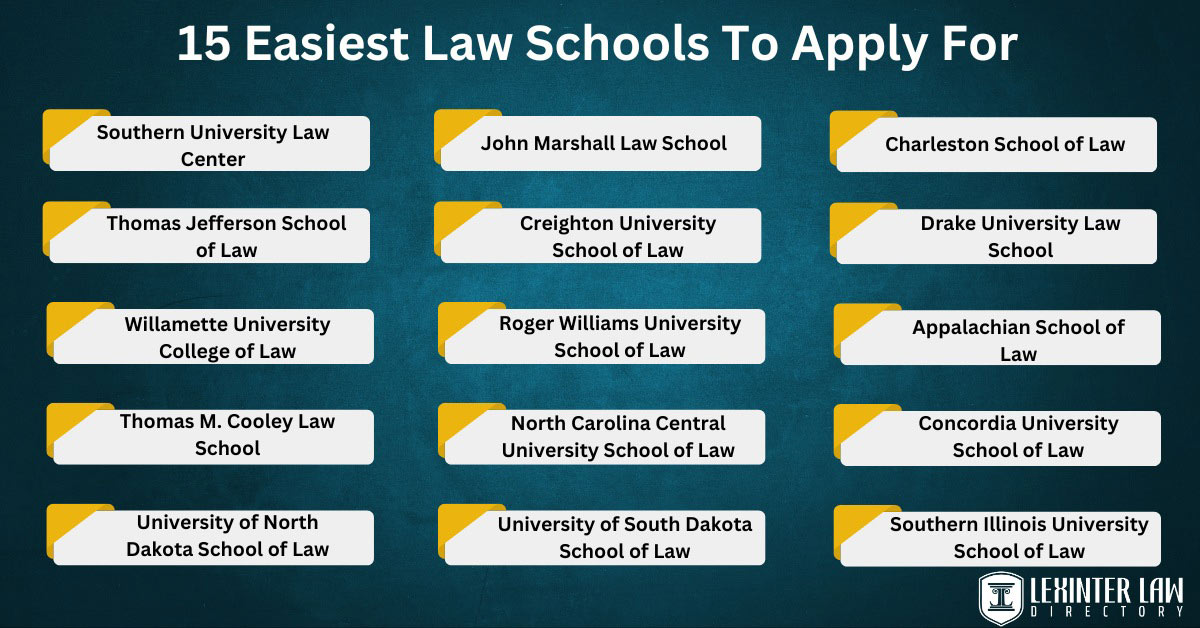
15 easiest law schools to apply for are listed below.
- Southern University Law Center: Southern University Law Center offers a relatively accessible application process, with an acceptance rate of around 53.46%. The institution emphasizes practical legal training and is known for its commitment to diversity and inclusion. Applicants are drawn to Southern University Law Center because it focuses on preparing students for public service and advocacy roles, particularly within underserved communities.
- John Marshall Law School: John Marshall Law School in Chicago maintains a flexible admissions process with an acceptance rate of around 65%. The institution focuses on experiential learning, providing students with hands-on legal experience through clinics and externships. John Marshall Law School offers part-time and evening programs, accommodating non-traditional students seeking to balance education with other commitments.
- Charleston School of Law: The Charleston School of Law provides a relatively straightforward application process, welcoming students with an acceptance rate of around 53.13%. Charleston offers various clinical programs that allow students to gain practical legal experience with a strong emphasis on public service. The school is committed to producing practice-ready graduates, making it an attractive option for prospective law students.
- Thomas Jefferson School of Law: Thomas Jefferson School of Law, based in San Diego, offers an easier admissions process with an acceptance rate of approximately 55%. The school provides a range of programs, including a flexible part-time option. Thomas Jefferson focuses on training future attorneys through theoretical and practical legal education, preparing graduates for diverse legal careers.
- Creighton University School of Law: Creighton University School of Law, located in Nebraska, is known for its approachable admissions criteria and a 71.36% acceptance rate. The law school offers a supportive learning environment and provides students with hands-on experience through its clinical programs. Creighton emphasizes service to others, reflecting its Jesuit mission in legal education.
- Drake University Law School: Drake University Law School, based in Iowa, offers an accessible application process and an acceptance rate of 69.42%. The institution strongly focuses on practical skills training and provides numerous opportunities for experiential learning. Drake Law School is particularly known for its emphasis on agricultural and constitutional law, offering specialized tracks for interested students.
- Willamette University College of Law: Willamette University College of Law in Oregon provides a straightforward admissions process with a 69.34% acceptance rate. The school emphasizes a strong combination of theory and practice, encouraging students to participate in externships and clinics. Willamette offers a collegial environment with a strong focus on public interest law, making it an appealing choice for applicants.
- Roger Williams University School of Law: Roger Williams University School of Law, located in Rhode Island, offers an accessible admissions process with a 65.19% acceptance rate. The institution is particularly known for its strong marine and environmental law programs. Students benefit from experiential learning opportunities through externships, clinics, and partnerships with regional organizations and law firms.
- Appalachian School of Law: Appalachian School of Law, situated in Virginia, offers a simpler application process with a 54.19% acceptance rate. The institution emphasizes community service and leadership, preparing students for legal careers in underserved areas. Appalachian School of Law focuses on practical training through internships, externships, and clinical programs, helping students develop real-world legal skills.
- Thomas M. Cooley Law School: Thomas M. Cooley Law School, located in Michigan, has a relatively high acceptance rate of 46.15% and a flexible admissions process. The school provides various legal education opportunities, including part-time and evening programs. Cooley emphasizes practical skills training and offers numerous clinics and externships, helping students gain valuable legal experience before graduating.
- North Carolina Central University School of Law: North Carolina Central University School of Law offers a more accessible admissions process with a 34.6% acceptance rate. The institution focuses on serving minority and low-income communities through its clinical programs. Students benefit from hands-on legal training and a curriculum designed to prepare them for the challenges of the legal profession.
- Concordia University School of Law: Concordia University School of Law, based in Idaho, provides a relatively easy admissions process with a 61.2% acceptance rate. The school focuses on practical legal education, offering experiential learning through externships and clinical opportunities. Concordia Law School has a strong commitment to serving underserved populations, making it a top choice for applicants interested in public service.
- University of North Dakota School of Law: The University of North Dakota School of Law provides an accessible application process with an acceptance rate of 62%. The institution offers a variety of experiential learning opportunities, including clinics and externships, helping students develop their legal skills. University of North Dakota School of Law prepares graduates for legal careers, especially in rural and underserved areas.
- University of South Dakota School of Law: The University of South Dakota School of Law offers a more straightforward admissions process with an acceptance rate of 76.16%. The school focuses on preparing students for practice in the public and private sectors. University of South Dakota School of Law provides hands-on learning opportunities through clinical programs and externships committed to practical legal training.
- Southern Illinois University School of Law: Southern Illinois University School of Law, located in Carbondale, Illinois, offers an accessible admissions process with a 60.47% acceptance rate. The institution focuses on public interest law, providing students with numerous opportunities for practical training. Southern Illinois University School of Law emphasizes hands-on learning through externships and clinics, preparing students for diverse legal careers.
Table of Contents
- 1. Southern University Law Center
- 2. John Marshall Law School
- 3. Charleston School Of Law
- 4. Thomas Jefferson School Of Law
- 5. Creighton University School Of Law
- 6. Drake University Law School
- 7. Willamette University College Of Law
- 8. Roger Williams University School Of Law
- 9. Appalachian School Of Law
- 10. Thomas M. Cooley Law School
- 11. North Carolina Central University School Of Law
- 12. Concordia University School Of Law
- 13. University Of North Dakota School Of Law
- 14. University Of South Dakota School Of Law
- 15. Southern Illinois University School Of Law
- How To Choose Which Easiest Law School To Apply For?
- What Are The Requirements For Applying To Law School?
- What Are The Benefits Of Getting Into Law School With Easy Admission?
- What Are The Downsides Of Getting Into Law School With Easy Admission?
- How Can Lexinter Help You Find Nearby Lawyers?
1. Southern University Law Center
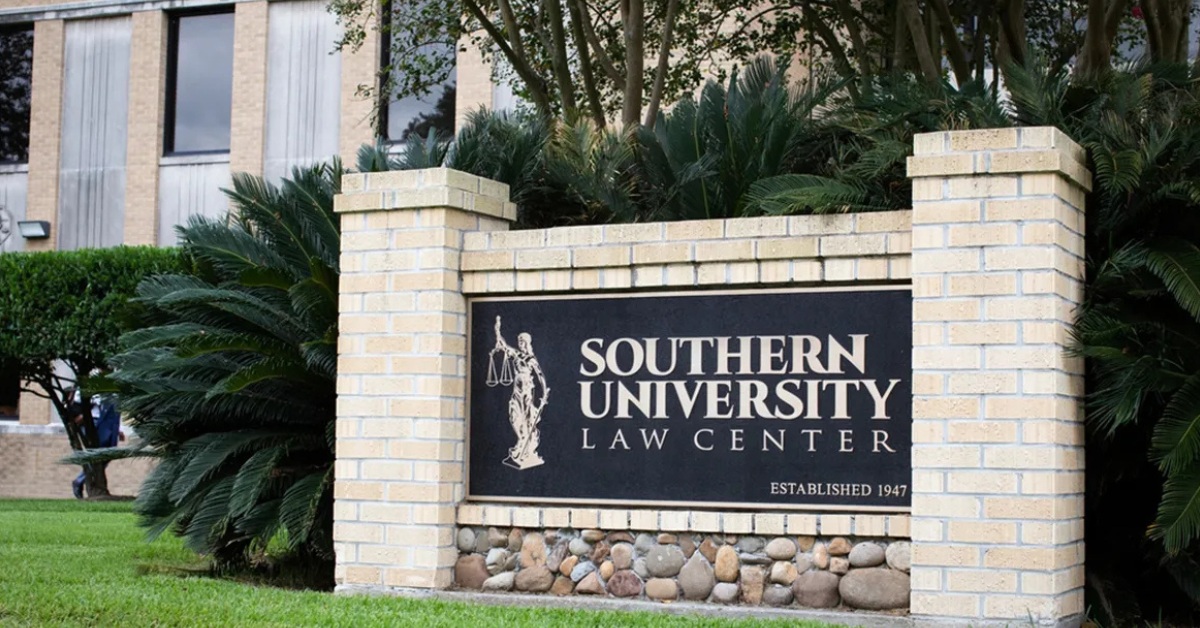
Southern University Law Center (SULC) is a public law school in Baton Rouge, Louisiana. The institution was founded in 1947 to provide legal education for African Americans during segregation. The institution opened in September 1947, aiming to promote equality and social justice. SULC remains one of the most racially diverse law schools in the United States and continues to provide opportunities for underrepresented communities.
Southern University Law Center is one of the easiest law schools to apply to due to its relatively higher acceptance rate of 53.46% and accessible admissions requirements. The law school prioritizes students from underrepresented communities, allowing applicants with lower LSAT scores or GPAs to be considered. Southern University Law Center is ranked in the lowest tier (#178-196) by U.S. News & World Report. The institution’s mission of fostering graduates committed to social justice, civil rights, and public service remains highly respected. Southern University Law Center holds full accreditation from the American Bar Association (ABA), granting graduates eligibility to sit for the Bar exam in most states.
Southern University Law Center has an acceptance rate of 53.46%, making it moderately competitive among law schools. The school admitted 548 students from 1,025 applicants for the 2024 academic year. The enrollment yield stands at 42.15%, reflecting the number of admitted students who decided to enroll. Southern University Law Center requires applicants to submit LSAT scores, with an average score of 147 for enrolled students. The 25th to 75th percentile range for LSAT scores is 144 to 149. GPA requirements include an average of 3.12, with percentiles ranging from 2.81 to 3.44. Applicants must hold a Bachelor’s degree from an accredited institution. Applicants must submit a personal statement, letters of recommendation, and a completed Law School Admission Council (LSAC) application in addition to academic records. Southern University Law Center emphasizes a well-rounded academic background for admission. Southern University Law Center’s Bar exam passage rate for first-time takers in 2023 was 52.94%. The rate is below Louisiana’s state average of 72.02%. Southern University Law Center graduates remain eligible for legal practice upon passing the Bar, even with the lower rate.
Southern University Law Center offers a Juris Doctor (JD) program, requiring the completion of 90 credit hours. The law school provides dual-degree options, including JD/MBA and JD/MPA programs, allowing students to combine legal education with business or public administration studies. Southern University Law Center offers specializations that align with its mission of promoting social justice and diversity. Available areas of specialization include civil rights law, public interest law, and criminal law. The programs prepare students for careers that focus on serving underrepresented communities and advocating for social change. Southern University Law Center’s tuition for the 2024 academic year is $17,434 for Louisiana residents and $30,034 for non-residents. The student body, with 52.56%, receives financial aid. The average financial aid package includes a grant of $11,500, helping to reduce the cost of attendance.
2. John Marshall Law School
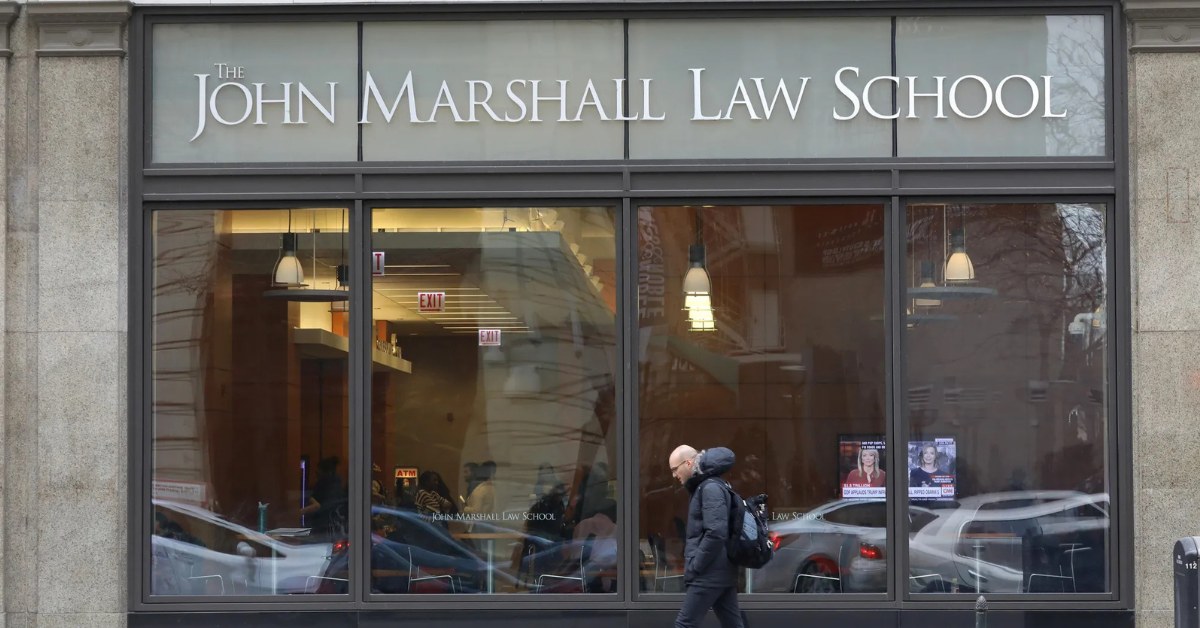
John Marshall Law School, now known as the University of Illinois Chicago School of Law (UIC Law), was founded in 1899 as an independent law institution in downtown Chicago. John Marshall Law School merged with the University of Illinois Chicago in 2019, becoming part of a larger academic community. The law school has been ABA-accredited since 1951, ensuring its graduates are eligible to sit for Bar exams in all U.S. states. The school offers students access to a vibrant legal market and numerous professional opportunities in Chicago.
John Marshall Law School is one of the easiest law schools to apply to due to its relatively higher acceptance rate of 65%. Applicants with an LSAT score of around 148 and a GPA of 3.1 are considered competitive, making the school more accessible than many others. John Marshall Law School ranks on the lower end of national law school rankings, placed at 161st in 2024. John Marshall Law School holds full accreditation from the American Bar Association (ABA), allowing graduates to sit for Bar exams nationwide, which remains a critical credential.
John Marshall Law School has an acceptance rate of 65% for the 2024 academic year, reflecting moderate selectivity. The applicant pool consisted of 1,041 individuals, with 488 accepted and 120 students enrolling, resulting in an enrollment yield of 24.59%. The law school continues attracting applicants while maintaining accessible admissions standards compared to other law schools. The average LSAT score for admitted students in the 2024 class is 150, with scores ranging from 149 to 153 for the 25th to 75th percentile. The median GPA is 3.19, extending from 2.78 to 3.51. Applicants are required to submit a personal statement, letters of recommendation, and academic transcripts. Several applicants include a resume that outlines their extracurricular activities and professional experience. The application deadline for Fall 2024 is July 21, 2024, ensuring ample time for prospective students to prepare their materials.
John Marshall Law School’s first-time Bar exam passage rate for 2023 was 64.94%, lower than Georgia’s state average of 77.48%. The law school offers a Juris Doctor (JD) degree with full-time and part-time options, focusing on developing practical legal skills. Students specialize in areas such as criminal justice, pursuing a Criminal Justice Certificate that prepares them for careers in prosecution or defense. The tuition fee for the 2024 academic year is $52,006, with the total cost of attendance, including living expenses, reaching approximately $82,412.
3. Charleston School Of Law
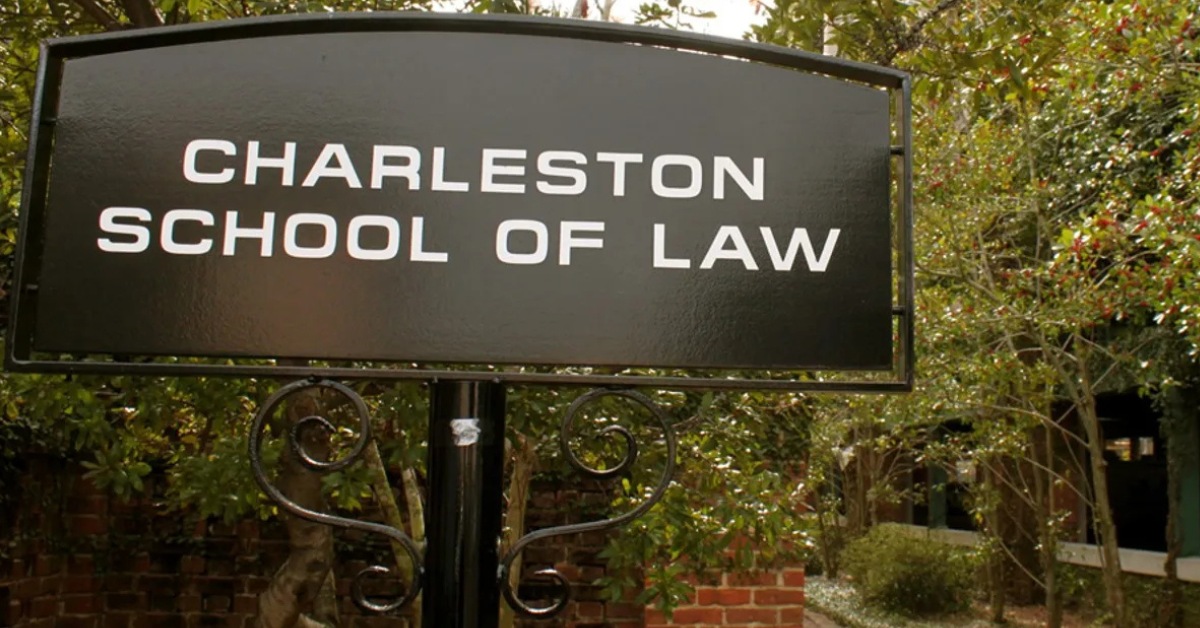
Charleston School of Law (CSOL) is a private law school established in 2003, located in Charleston, South Carolina. The law school benefits from its location in Charleston, a historic city known for its rich cultural heritage and vibrant legal community. The institution emphasizes public service and a student-centered approach to legal education. Charleston School of Law received full accreditation from the American Bar Association (ABA) in 2011, allowing its graduates to sit for the Bar exam nationwide.
Charleston School of Law is one of the easiest law schools to apply to due to its acceptance rate of around 53.13%. The law school ranks lower on national law school rankings, but the institution remains respected for its strong faculty support and community service-oriented approach. Charleston School of Law holds full ABA accreditation, which allows its graduates to take the Bar exam in any state.
Charleston School of Law has an acceptance rate of 53.13%, indicating a moderately competitive admissions process. The school remains accessible for many law school applicants due to its relatively flexible LSAT and GPA requirements. The moderate selectivity allows prospective students to find Charleston School of Law an appealing option among ABA-accredited institutions. The average LSAT score for admitted students during the 2023-2024 academic year is 153, with scores ranging from 149 to 154 for the 25th to 75th percentile. The median GPA stands at 3.49, with the 25th to 75th percentile range from 3.2 to 3.72. Applicants must submit a personal statement, letters of recommendation, and transcripts as part of the application process. Charleston School of Law accepts GRE scores as an alternative to the LSAT, offering flexibility for prospective students.
The Bar exam passage rate for first-time test takers at Charleston School of Law is 65.63%, slightly below South Carolina’s average of 74.61%. The school offers a Juris Doctor (JD) degree, requiring students to complete 90 credit hours of coursework. Formal specializations are not outlined, but students participate in clinics, externships, and pro bono opportunities, gaining practical experience in fields such as criminal law, environmental law, and alternative dispute resolution. The tuition for the 2024 academic year is $46,134, with additional living and personal expenses bringing the total estimated cost of attendance to $75,986.
4. Thomas Jefferson School Of Law
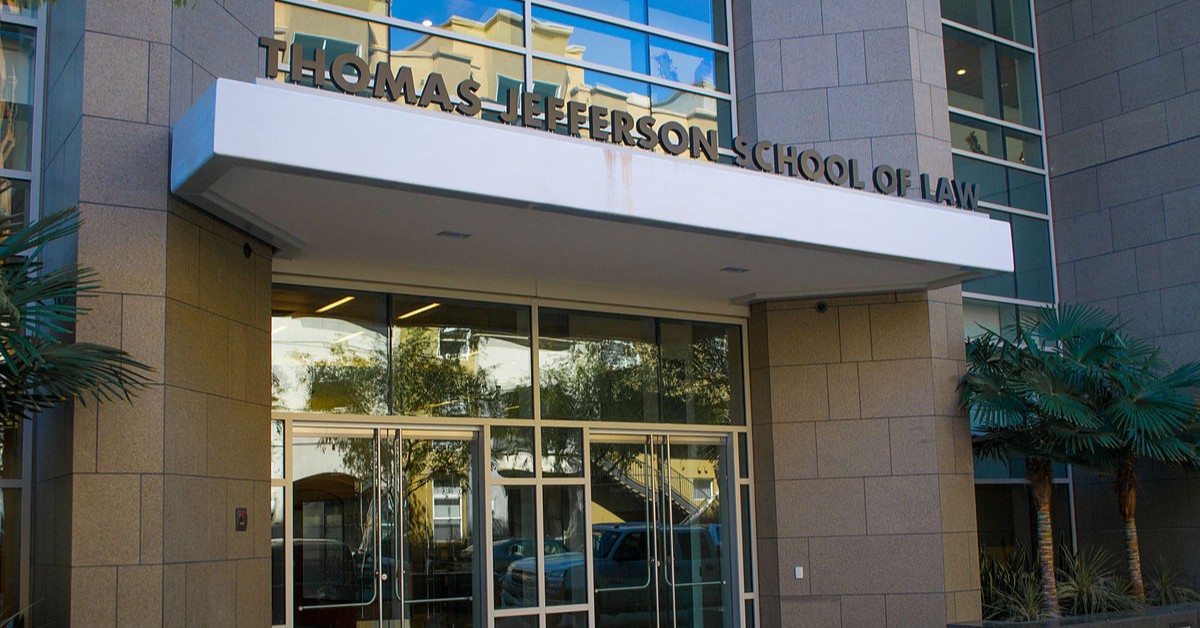
Thomas Jefferson School of Law was established in 1969 as part of the Western State University College of Law before becoming an independent institution in 1995. The school is located in the urban setting of San Diego, California, offering students access to a vibrant legal market. The law school focuses on providing legal education to students from diverse and non-traditional backgrounds, helping them overcome obstacles faced in more conventional academic settings.
Thomas Jefferson School of Law is one of the easier law schools to apply for due to its relatively lower LSAT and GPA requirements. The median LSAT score for admitted students is around 149, while the GPA requirement falls below 3.0. The accessibility has contributed to a higher acceptance rate than other law schools. Thomas Jefferson School of Law ranks in the lower tiers of national law school rankings, reflecting the institution’s challenges, particularly with Bar passage rates and accreditation. The school lost its American Bar Association (ABA) accreditation in December 2019 but remains accredited by the Committee of Bar Examiners of the State Bar of California.
Thomas Jefferson School of Law has an acceptance rate of around 55%, making it moderately competitive compared to other law schools. The school offers an accessible admissions process, particularly for students with lower LSAT scores and GPAs, providing opportunities for applicants who do not meet the criteria of more competitive institutions. The LSAT scores for enrolled students in the 2024 academic year range from 147 to 150, with a median score of 149. The GPA range is between 2.52 and 3.12, with an average GPA of 2.87. Applicants must submit a personal statement, letters of recommendation, and a résumé. Interviews are required in some cases. The school accepts applications on a rolling basis, allowing flexibility for prospective students.
The Bar exam passage rate for Thomas Jefferson School of Law’s 2023 graduates was 63.8%, lower than state and national averages. The school offers a Juris Doctor (JD) degree with full-time and part-time options. Thomas Jefferson School of Law provides online LL.M. programs, including specializations in Taxation and International Taxation. Students specialize in intellectual property, international law, and social justice. Tuition for the 2024 academic year is approximately $46,134, with financial aid and scholarships available to help manage costs.
5. Creighton University School Of Law
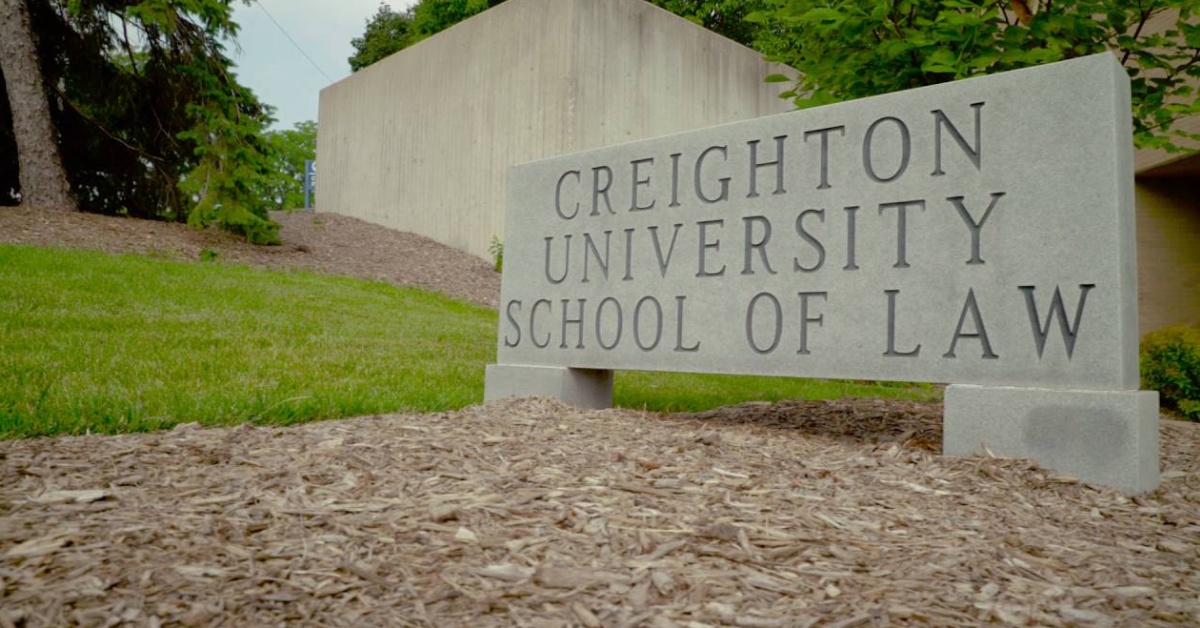
Creighton University School of Law is a Jesuit-affiliated institution located in Omaha, Nebraska, founded in 1904. The law school emphasizes a holistic legal education, focusing on ethical, professional, and intellectual development. The law school has a long history of legal education rooted in Jesuit traditions, promoting ethical leadership, social justice, and service. Creighton’s curriculum integrates Jesuit values, prioritizing social justice and public service, which remains central to the school’s mission.
Creighton University School of Law is one of the easier law schools to apply for, with an acceptance rate of 71.36%. The school requires an average LSAT score of 152 and a GPA of 3.35, making it moderately competitive but accessible for many applicants. Creighton University School of Law does not rank in the top tier of national law schools, focusing instead on public service, ethics, and practical training. Creighton University School of Law has been fully accredited by the American Bar Association (ABA) since 1924, allowing its graduates to sit for the Bar exam in any U.S. jurisdiction.
Creighton University School of Law has an acceptance rate of 71.36% for the 2023-2024 academic year, making it relatively accessible compared to other law schools. The high acceptance rate offers a strong opportunity for applicants to meet the school’s academic requirements. Creighton University School of Law provides an appealing option for students seeking a law school with moderate selectivity. The average LSAT score for admitted students is 152, ranging from 149 to 156. The median GPA is 3.35, with the 25th to 75th percentile range spanning 3.01 to 3.63. Applicants must submit official transcripts, a personal statement, a résumé, and letters of recommendation. Creighton University School of Law charges an application fee, which is waived for early applicants, adding flexibility to the admissions process.
The Bar exam passage rate for Creighton University School of Law graduates in 2023 was 65.31%, slightly below the national average. Creighton University offers a Juris Doctor (JD) as its primary law degree and dual-degree programs such as JD/MBA and JD/MS. Specializations are available in Business and Commercial Law, Criminal Law, Family Law, and International and Comparative Law. Tuition for the 2024-2025 academic year is $51,430, with financial aid available to most full-time students.
6. Drake University Law School
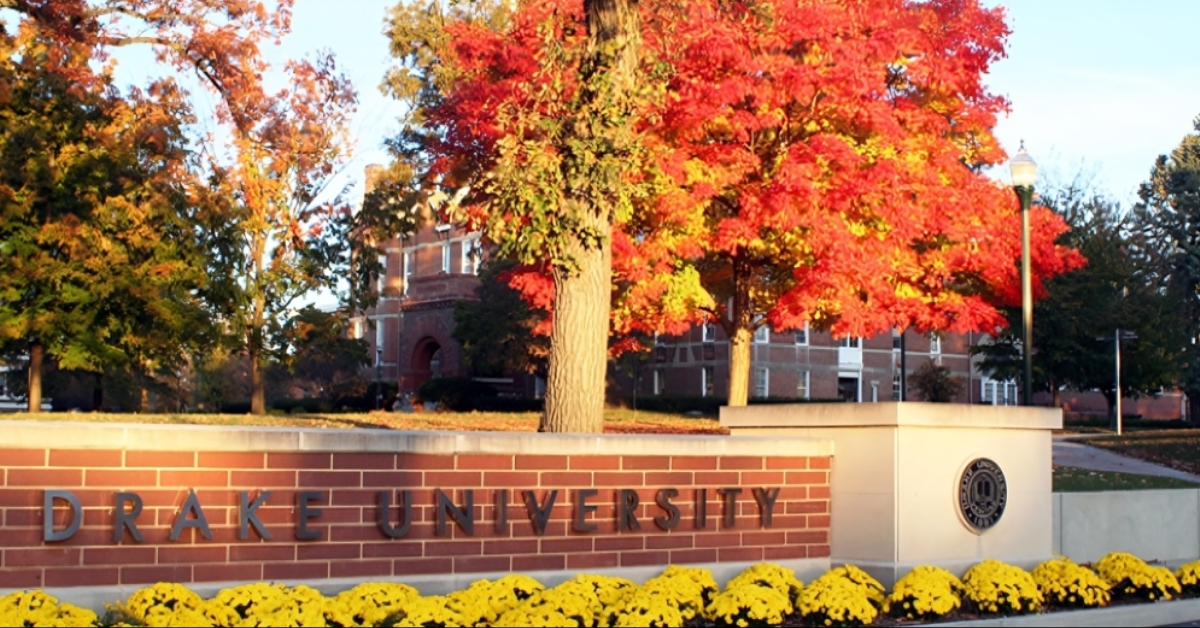
Drake University Law School, founded in 1865, is located in Des Moines, Iowa. The law school’s location in the capital city provides students with numerous opportunities for clerkships, internships, and professional interactions within the local legal community. The institution emphasizes practical legal training alongside a strong theoretical foundation as one of the oldest law schools in the United States. Drake University Law School is well-known for its First-Year Trial Practicum, allowing students to observe live trials during their first year.
Drake University Law School has a relatively accessible acceptance rate of 69.42%, making it one of the easier law schools to apply for. The admissions process offers opportunities for a wide range of applicants, with a median LSAT score of 154 and a GPA of 3.49. Drake University Law School, ranked #82 by U.S. News & World Report for 2024, is particularly recognized for its legal writing program, which ranks 11th nationally. Drake University Law School holds full American Bar Association (ABA) accreditation, allowing graduates to sit for the Bar exam in any U.S. jurisdiction.
Drake University Law School has an acceptance rate of 69.42%, making it more accessible than many other U.S. law schools. The higher acceptance rate provides students with a strong opportunity for admission if they meet the academic and application criteria. The law school remains a favorable option for applicants seeking a well-rounded legal education. The median LSAT score for admitted students in the 2023-2024 academic year is 154, ranging from 151 to 157. The median GPA is 3.49, ranging from 3.29 to 3.77. Applicants must submit a personal statement, official transcripts, and letters of recommendation. The application process involves the Credential Assembly Service (CAS), ensuring that all necessary documents, including LSAT scores and transcripts, are compiled and submitted properly.
Drake University Law School’s Bar exam passage rate for 2023 graduates was 90.6%, well above the national average. The school offers a Juris Doctor (JD) program and joint degrees like JD/MBA and JD/MPA. Specializations are available in Agricultural Law, Constitutional Law, Criminal Law, and Family Law, with hands-on clinical programs providing practical experience. Tuition and fees for the 2024 academic year total $48,410, with approximately 82% of students receiving grants or scholarships to offset the cost.
7. Willamette University College Of Law
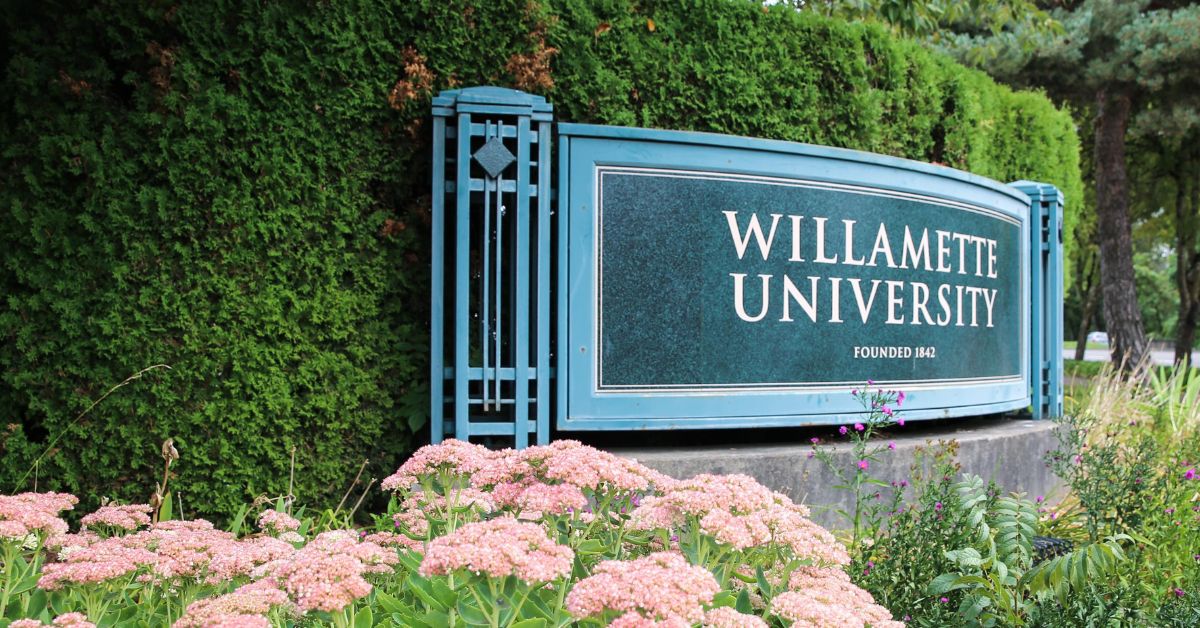
Willamette University College of Law, founded in 1883, is located in Salem, Oregon, making it the oldest law school in the Pacific Northwest. The law school emphasizes community service and legal innovation and is known for producing problem-solving lawyers and leaders. The school has expanded its academic offerings and facilities throughout the years, including the Oregon Civic Justice Center, enhancing the practical learning experience for students. The school’s proximity to key governmental institutions offers students exceptional opportunities for practical engagement in legal and governmental affairs.
Willamette University College of Law is one of the easiest law schools to apply for, with an acceptance rate of 69.34%. The median LSAT score for incoming students is 152, and the median GPA is 3.26, making the admissions process accessible for many applicants. Willamette University College of Law is not ranked among the top-tier law schools but holds a position around #149 in national law school rankings. The school has full American Bar Association (ABA) accreditation, allowing its graduates to sit for the Bar exam in any U.S. state.
Willamette University College of Law has an acceptance rate of 69.34%, making it more accessible than many other law schools. The relatively high acceptance rate provides opportunities for a wider range of applicants, including individuals with modest academic credentials. The school remains an attractive option for students seeking a supportive legal education environment. The average LSAT score for admitted students is 152, with scores ranging from 150 to 156. The median GPA for students is 3.26, ranging from 3.01 to 3.59. Applicants must submit a personal statement, official transcripts, LSAT or GRE scores, and two letters of recommendation. Willamette University College of Law does not charge an application fee, enhancing the accessibility of the application process.
The Bar exam passage rate for 2023 graduates was 52.69%, lower than the average for Oregon state of 74%. Willamette University College of Law offers a Juris Doctor (JD) degree, along with joint degrees like JD/MBA and JD/MA. Specializations include public service, business law, health law, and dispute resolution. Tuition for the 2024-2025 academic year is $53,994, with around 81% of students receiving scholarships or grants.
8. Roger Williams University School Of Law
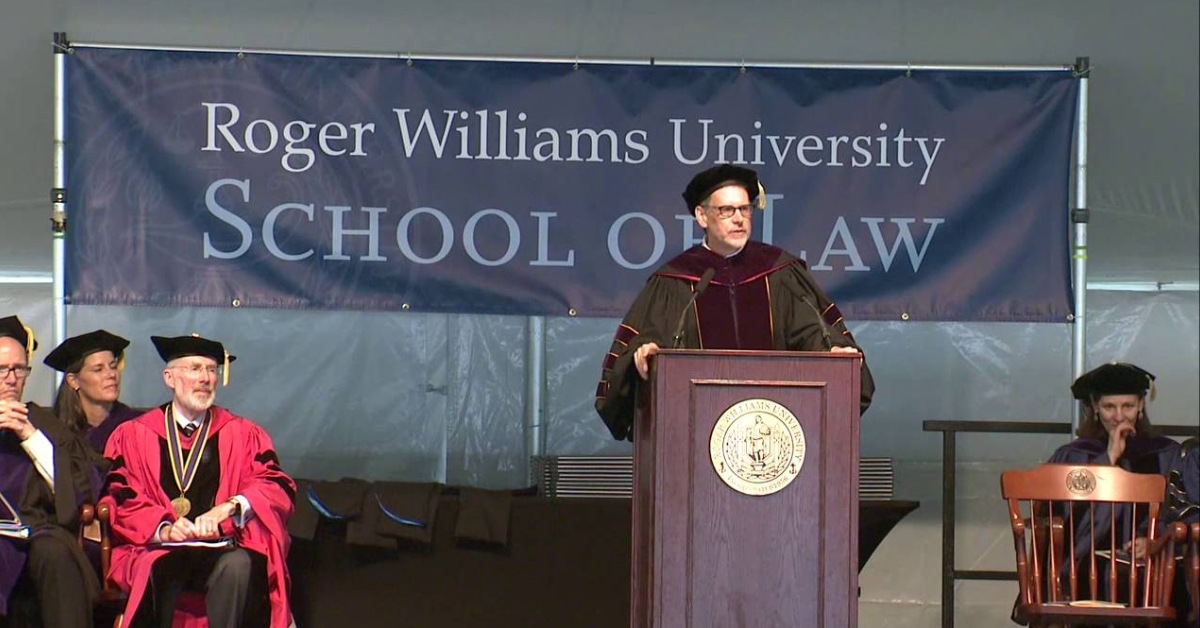
Roger Williams University School of Law (RWU Law), founded in 1992, is a private law school located in Bristol, Rhode Island. The school’s proximity to the state capital, Providence, offers students access to externships, clerkships, and opportunities with state and federal courts, as well as various government agencies. RWU Law offers students unique access to Rhode Island’s legal and governmental institutions as the only law school in the state. The law school emphasizes public service and experiential learning, ensuring that students gain hands-on legal experience through clinical or externship programs.
Roger Williams University School of Law is one of the easier law schools to apply for, with an acceptance rate of 65.19%. The admissions process is holistic, taking into account LSAT scores, GPA, personal statements, recommendations, and life experiences. RWU Law ranks #172 (tie) among national law schools according to U.S. News & World Report for 2024. Roger Williams University School of Law holds full American Bar Association (ABA) accreditation, allowing its graduates to sit for the Bar exam in all U.S. jurisdictions.
Roger Williams University School of Law (RWU Law) has an acceptance rate of 65.19%, making it accessible to many applicants. The school’s holistic admissions process considers LSAT scores, GPA, personal statements, and life experiences. The approach allows a diverse group of students to apply successfully. The median LSAT score for admitted students during the 2023-2024 academic year is 150, ranging between 147 and 154. The median GPA is 3.30, with scores ranging from 2.93 to 3.65. Applicants must submit a personal statement, official transcripts, and at least one letter of recommendation. The admissions process does not enforce strict cut-off scores for LSAT or GPA, emphasizing an applicant’s overall background.
The Bar exam passage rate for RWU Law graduates in 2023 was 47.41%, lower than the Rhode Island state average of 71.1%. RWU Law offers a Juris Doctor (JD) degree, with joint degree options like the JD/Master of Marine Affairs. Specializations in public interest law and marine affairs reflect the school’s focus on social justice and environmental law. The Marine Affairs Institute offers practical training in areas such as admiralty law, coastal policy, and fisheries regulation. Tuition for the 2024-2025 academic year is $48,064, with the total cost of attendance reaching approximately $73,564. 72.96% of students receive financial aid, averaging $25,869 per student.
9. Appalachian School Of Law
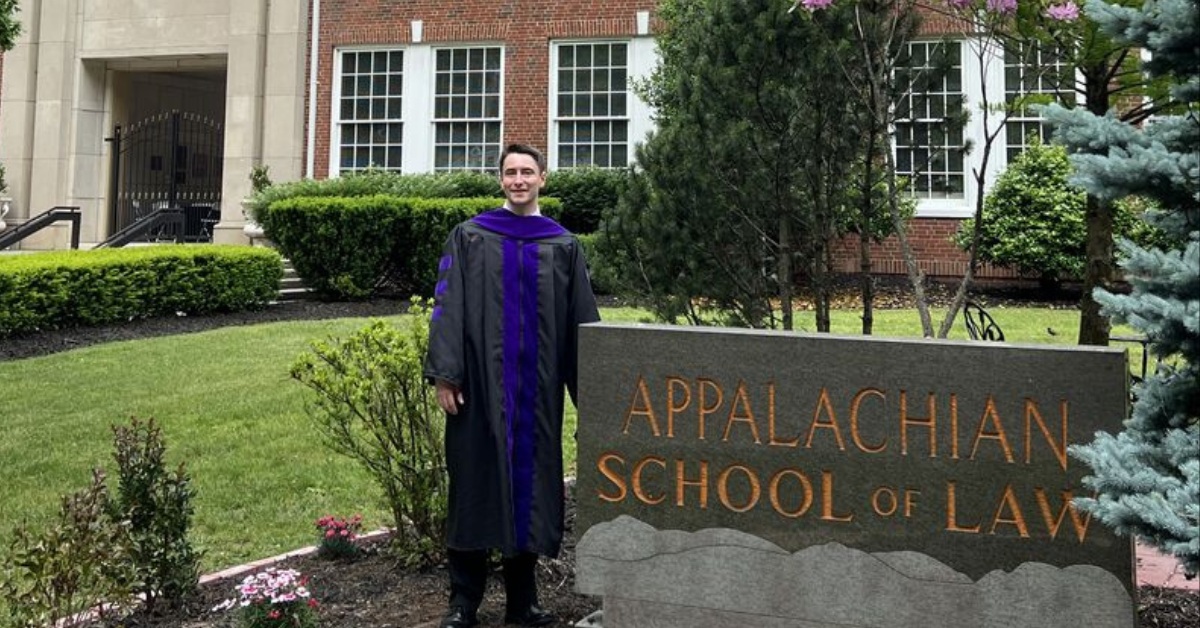
Appalachian School of Law (ASL), established in 1994, is a private, ABA-accredited law school located in Grundy, Virginia. ASL focuses on producing community leaders and emphasizes experiential learning alongside traditional legal education. The school’s rural location in the Appalachian Mountains provides a serene environment for focused legal studies. Students benefit from close proximity to local courts and legal institutions, contributing to a strong emphasis on public service and leadership within the legal community. The campus includes modern facilities with access to over 227,000 library volumes to support legal research.
Appalachian School of Law is considered one of the easier law schools to apply for, with an acceptance rate of approximately 54.19%. The school offers a holistic admissions process, considering LSAT scores, GPAs, and personal background. ASL’s Pre-Admission Summer Opportunity (PASO) program provides additional access to students whose scores do not fully reflect their potential. The school ranks in the lower tier of national law schools but is recognized for its strong focus on practical legal training and public service. Appalachian School of Law is fully accredited by the American Bar Association, allowing its graduates to sit for the Bar exam nationwide.
Appalachian School of Law has an acceptance rate of 54.19%, making it more accessible than many other law schools. The school’s holistic admissions process considers LSAT scores, GPA, and personal factors such as background and experience. The approach helps applicants from diverse academic and personal backgrounds to succeed in the admissions process. The average LSAT score for admitted students is 146, with scores ranging from 145 to 151. The average GPA is 3.13, with a range between 2.65 and 3.5. Applicants must submit a personal statement, letters of recommendation (up to three), and a résumé. The absence of an application fee makes the process more accessible to many applicants.
The Bar exam passage rate for Appalachian School of Law graduates in 2023 was 61.22%, lower than the national average of 77%. Appalachian School of Law offers a Juris Doctor (JD) degree and certificate programs in areas such as Natural Resources Law and Litigation. The curriculum emphasizes practical legal training, requiring students to complete an externship. Specializations include Natural Resources Law, reflecting the school’s location in the Appalachian region. Tuition for the 2024 academic year is $41,000, with around 80% of students receiving financial aid, averaging $20,500 in grants.
10. Thomas M. Cooley Law School
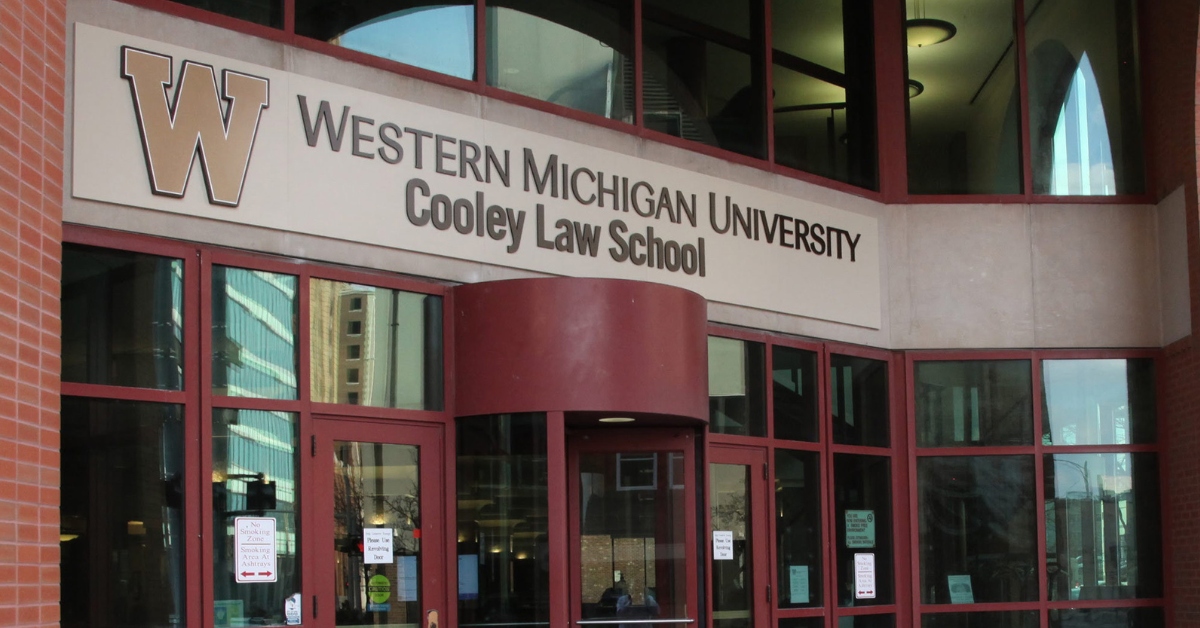
Thomas M. Cooley Law School, established in 1972, is a private law school situated in Lansing, Michigan. Thomas M. Cooley Law School was established by a group of Michigan lawyers and judges led by former Michigan Supreme Court Chief Justice Thomas E. Brennan. The school was named after 19th-century jurist Thomas McIntyre Cooley. The institution focuses on providing accessible legal education to diverse students and emphasizes practical, hands-on legal training. Cooley is one of the largest law schools in the United States, with a long-standing reputation for helping students prepare for the challenges of legal practice.
Thomas M. Cooley Law School is considered one of the easier law schools to apply for, with an acceptance rate of 46.15%. The admissions policy is inclusive, allowing applicants with varying academic backgrounds to be considered. The law school ranks in the lower tiers but maintains full American Bar Association (ABA) accreditation, permitting graduates to sit for the Bar exam in any U.S. state. The school continues to provide practical legal training, supporting students in gaining real-world experience.
Thomas M. Cooley Law School has an acceptance rate of 46.15%, making it accessible to many applicants. The law school’s inclusive admissions policy allows students from diverse academic backgrounds to be considered for admission. The school focuses on providing an education that prepares students for the practical challenges of the legal field. The average LSAT score for admission is 148, and the GPA requirement is generally 3.07. Applicants must submit letters of recommendation, a personal statement, and a résumé in addition to their LSAT scores and academic transcripts. Thomas M. Cooley Law School evaluates applicants holistically, considering factors beyond test scores and grades to ensure a comprehensive review of each application.
The Bar exam passage rate for Thomas M. Cooley Law School graduates in 2023 was lower than the national average, reflecting the challenges faced by some students. The law school offers a Juris Doctor (JD) degree, and students specialize in areas such as Business Law, Constitutional Law, Criminal Law, and Intellectual Property Law. Thomas M. Cooley Law School emphasizes practical skills training, helping students gain valuable legal experience through clinics and externships. Tuition at Thomas M. Cooley Law School is $46,240 for the 2024 academic year. Financial aid is available to help students manage costs, and the law school offers grants and scholarships to qualified students. The financial aid program ensures that students from various economic backgrounds access legal education and pursue their professional goals.
11. North Carolina Central University School Of Law
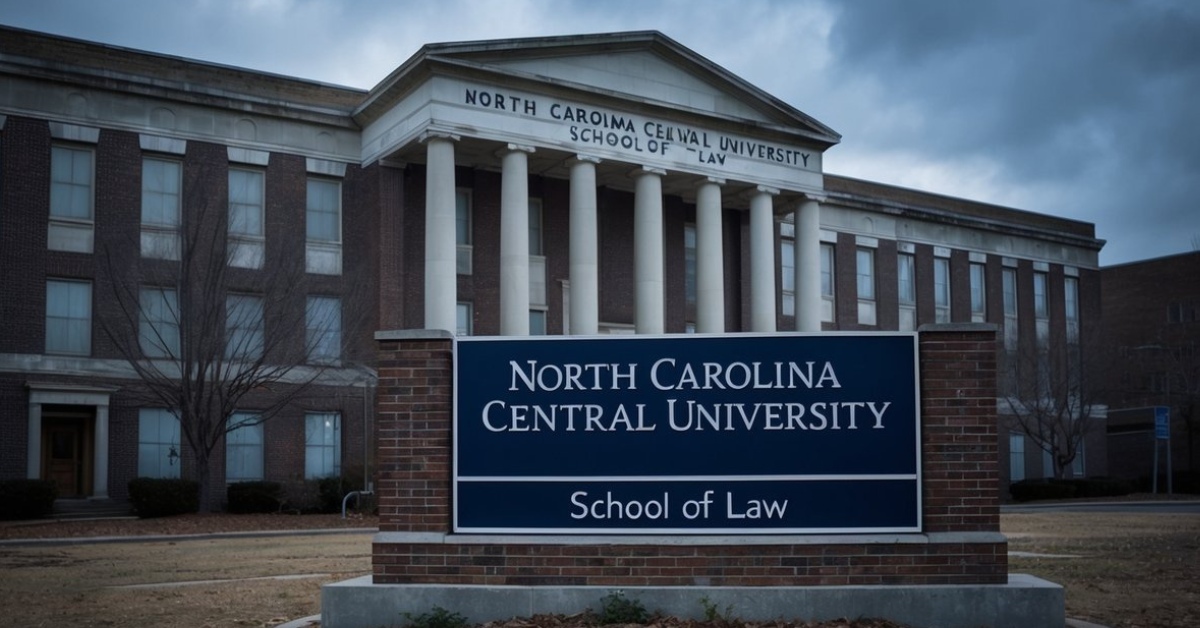
North Carolina Central University (NCCU) School of Law, founded in 1939, is a historically Black law school located in Durham, North Carolina. The law school, founded to provide legal education to African-American students during segregation, remains committed to promoting diversity and delivering affordable, high-quality legal education. The law school places a strong emphasis on public service, reflecting its mission to serve underrepresented communities.NCCU School of Law has maintained its historical mission of serving underrepresented communities while expanding its academic offerings to include inter-institutional agreements with neighboring institutions.
North Carolina Central University School of Law is considered one of the easier law schools to apply for, with an acceptance rate of approximately 34.6%. The admissions process is accessible to students from diverse academic backgrounds, offering programs such as the Performance-Based Admissions Program (PBAP) for applicants who do not meet traditional criteria. NCCU School of Law ranks within the lower tier of national law schools but is recognized for its strengths in public interest law, diversity, and clinical education. The American Bar Association (ABA) fully accredited the school, ensuring its graduates sit for the Bar exam in any U.S. state.
North Carolina Central University School of Law has an acceptance rate of 34.6%, reflecting its moderately competitive admissions process. The school’s mission to serve historically underserved communities makes it accessible to applicants from diverse backgrounds. The law school balances selectivity with a commitment to diversity and public service in the legal profession. The median LSAT score for admitted students in the 2023-2024 cycle is 149, with a GPA median of 3.35. Applicants must submit two letters of recommendation, a personal statement, and official transcripts. North Carolina Central University School of Law does not accept GRE scores. The Performance-Based Admissions Program (PBAP) offers an alternative pathway to admission for students who do not meet standard academic benchmarks.
The first-time Bar passage rate for North Carolina Central University School of Law graduates in 2023 was 56.6%, reflecting a focus on improving long-term Bar exam outcomes. The law school offers a Juris Doctor (JD) degree, with full-time and part-time programs available. Joint degrees such as JD/MBA and JD/MPA allow students to combine legal studies with business or public administration education. Specializations include Civil Rights, Constitutional Law, Dispute Resolution, and Intellectual Property Law, providing students with opportunities for in-depth study and practical experience. Tuition for in-state students is approximately $19,764, while out-of-state students pay around $43,000, with the total cost of attendance, including living expenses, reaching up to $63,678.
12. Concordia University School Of Law
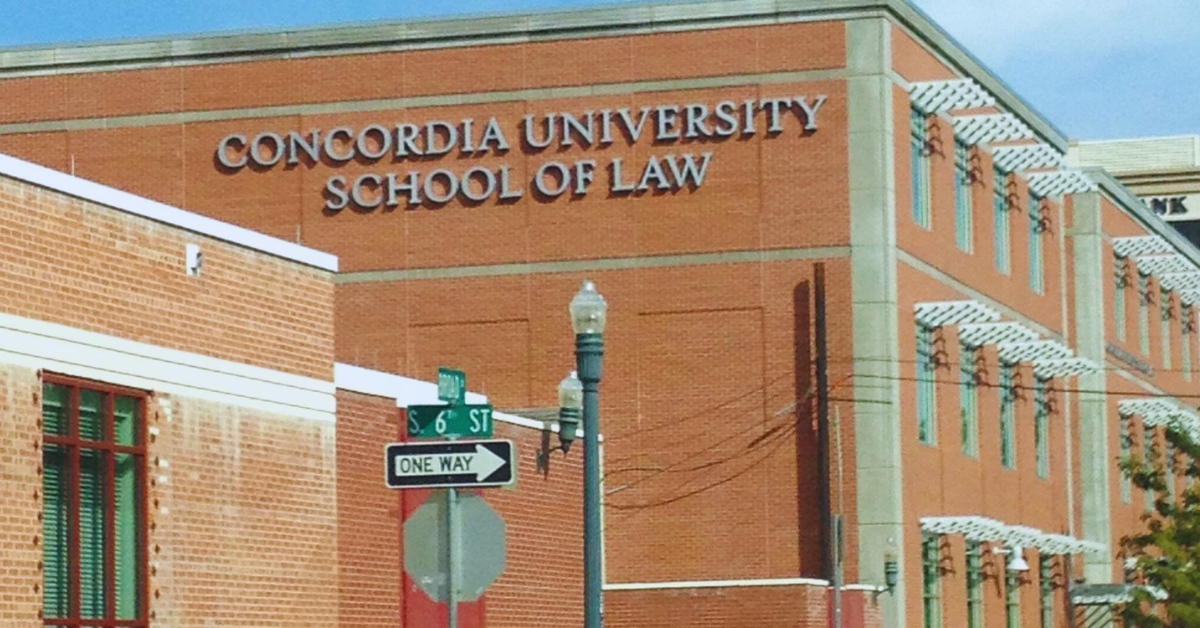
Concordia University School of Law, founded in 2012 in Boise, Idaho, was a private law school that emphasized community service and practical legal education. The school was part of Concordia University-Portland, and despite its brief history, it sought to integrate students into the legal community of Idaho. Concordia University School of Law closed in 2020 due to financial challenges faced by its parent institution.
Concordia University School of Law was one of the easier law schools to apply for, with an acceptance rate of around 61.2%. The school had a reputation for accessibility and maintained moderate admission standards, providing opportunities for many applicants. Concordia University School of Law was not ranked among the top national law schools. The school focused on achieving strong employment outcomes in Idaho, with a 75% employment rate for graduates 10 months after completing the program. The American Bar Association (ABA) fully accredited the school in 2019, allowing its graduates to sit for the Bar exam in any U.S. state before its closure.
Concordia University School of Law’s acceptance rate was 61.2%, making it accessible to many applicants. The school maintained its mission to offer legal education to students from diverse backgrounds, reflecting its commitment to inclusivity. The admissions process allowed a broad spectrum of students to be considered for acceptance. The median LSAT score for full-time students was 148, with scores between 146 and 152 for the 25th to 75th percentile range. The median GPA was 3.22, with a range from 2.85 to 3.45. Applicants were required to submit a personal statement, letters of recommendation, and academic transcripts. The absence of an application fee and the school’s rolling admissions policy further enhanced accessibility for prospective students.
The first-time Bar exam passage rate for Concordia University School of Law graduates in 2019 was 83.3%, higher than Idaho’s state average of 79.3%. Concordia University School of Law offered a traditional Juris Doctor (JD) degree, with experiential learning opportunities like externships and clinics as integral parts of the program. The curriculum focused on practical legal training and public service, helping students gain hands-on experience in fields such as business law, family law, and criminal law. Tuition at Concordia University School of Law for the 2020 academic year was $30,343. 50% of students received approximately $8,000 or more in financial aid grants, which helped reduce the overall cost of attendance for many students.
13. University Of North Dakota School Of Law
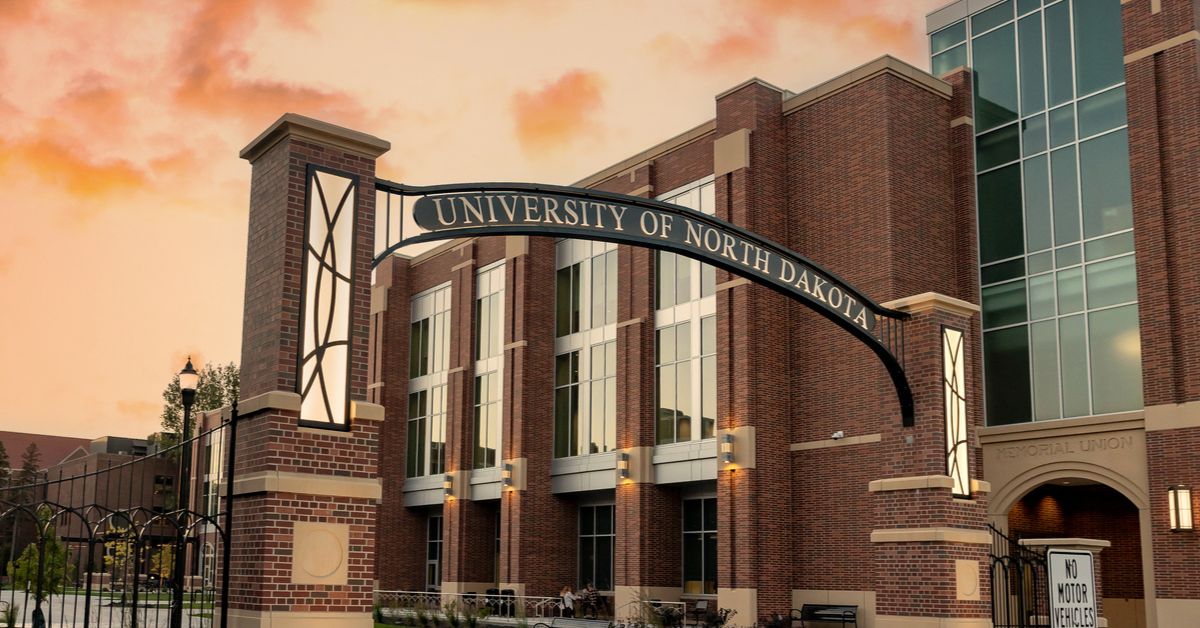
The University of North Dakota (UND) School of Law, founded in 1899, is the only law school in North Dakota. The University of North Dakota School of Law was the first professional school at the University of North Dakota. The school, located in Grand Forks, offers a well-rounded legal education combining theoretical knowledge and practical skills. The school provides personalized attention and faculty mentoring with a small student body of around 250 students.
The University of North Dakota School of Law is one of the easier law schools to apply for, with an acceptance rate of 62%. The admissions process evaluates academic credentials, personal background, and experiences, offering a holistic approach to prospective students. UND Law ranked #168 nationally, is known for its strengths in legal writing and environmental law, focusing on practical training through clinics and externships. The school has maintained full accreditation from the American Bar Association (ABA) since 1923, ensuring its graduates sit for the Bar exam in all U.S. jurisdictions.
The University of North Dakota (UND) School of Law has an acceptance rate of 62%, offering an accessible legal education to diverse students. The acceptance rate reflects the school’s commitment to providing a high-quality legal education while maintaining inclusivity for students from diverse academic backgrounds. The median LSAT score for admitted students is 150, ranging between 146 and 153. The median GPA is 3.37, with the 25th to 75th percentile range spanning from 3.12 to 3.79. Applicants must submit LSAT scores, undergraduate transcripts, a personal statement, and up to three letters of recommendation. UND School of Law follows a rolling admissions model, encouraging early applications to improve chances of acceptance and scholarship consideration.
The first-time Bar passage rate for UND School of Law graduates in 2023 was 63.01%, slightly below the state average. The school offers a Juris Doctor (JD) degree and joint degrees such as JD/MBA and JD/MPA, providing interdisciplinary study opportunities. Specializations include certificates in Aviation Law, Energy, Environment, and Natural Resources Law, as well as American Indian and Tribal Law. Tuition at UND School of Law for the 2024 academic year is $17,396 for North Dakota residents and $32,648 for out-of-state students. Additional living expenses average around $14,400 per year, contributing to the overall cost of attendance.
14. University Of South Dakota School Of Law
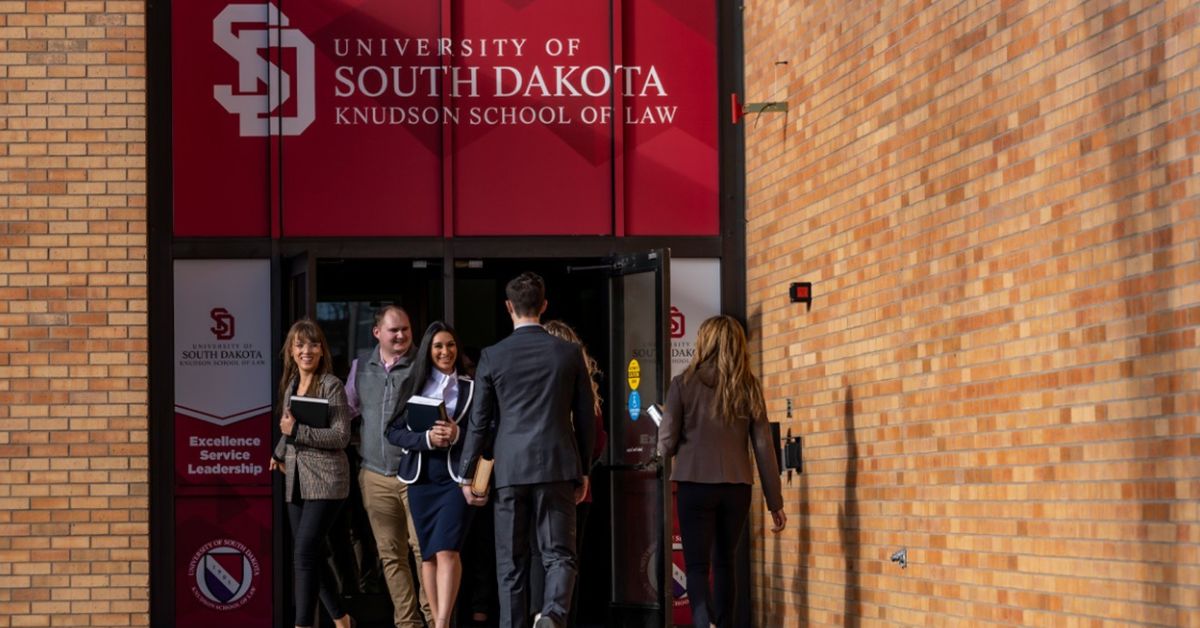
The University of South Dakota (USD) School of Law, known as the Knudson School of Law, was established in 1901 and remains the only law school in South Dakota. The school offers a high-quality legal education focusing on public service and practical training. Small class sizes allow students to receive personalized attention and an engaging learning experience. The school’s commitment to community service and public interest law remains central to its mission of preparing students for legal careers within the region.
The University of South Dakota School of Law is one of the easier law schools to apply for, with an acceptance rate of 76.16%. The affordability of the UND School of Law makes it an attractive option for students seeking solid legal education without the intense competition of higher-ranked schools. The law school ranked among the lower tiers nationally and is recognized for its strengths in trial advocacy, ranking No. 47 in the U.S. News & World Report. The University of South Dakota School of Law has been accredited by the American Bar Association (ABA) since 1923, ensuring its graduates take the Bar exam in any U.S. state.
The University of South Dakota (USD) School of Law, known as Knudson School of Law, has an acceptance rate of 76.16%. The high acceptance rate makes it one of the most accessible law schools in the United States. The relatively high acceptance rate reflects the school’s commitment to offering legal education to diverse applicants, maintaining a strong focus on public service and regional legal practice. The median LSAT score for admitted students in the 2023-2024 academic year is 151, with a GPA median of 3.56. Applicants must submit official LSAT scores, undergraduate transcripts, a personal statement, and letters of recommendation. The school does not accept GRE scores, and no part-time program is available, ensuring that all students engage fully in the academic community.
The first-time Bar passage rate for USD Law graduates in 2023 was 67.27%, slightly below the South Dakota state average. The school offers a Juris Doctor (JD) degree, along with joint degrees such as JD/MBA and JD/MPA, allowing for interdisciplinary study. Specialized certificates are available in Indian Law and Business Law, with hands-on learning opportunities through clinics focused on criminal defense, family law, and elder law. Tuition at USD School of Law for the 2023-2024 academic year is $16,793 for in-state students and $36,333 for out-of-state students. The total estimated cost of attendance is $48,435, making the law school an affordable option for many students, including living costs.
15. Southern Illinois University School Of Law
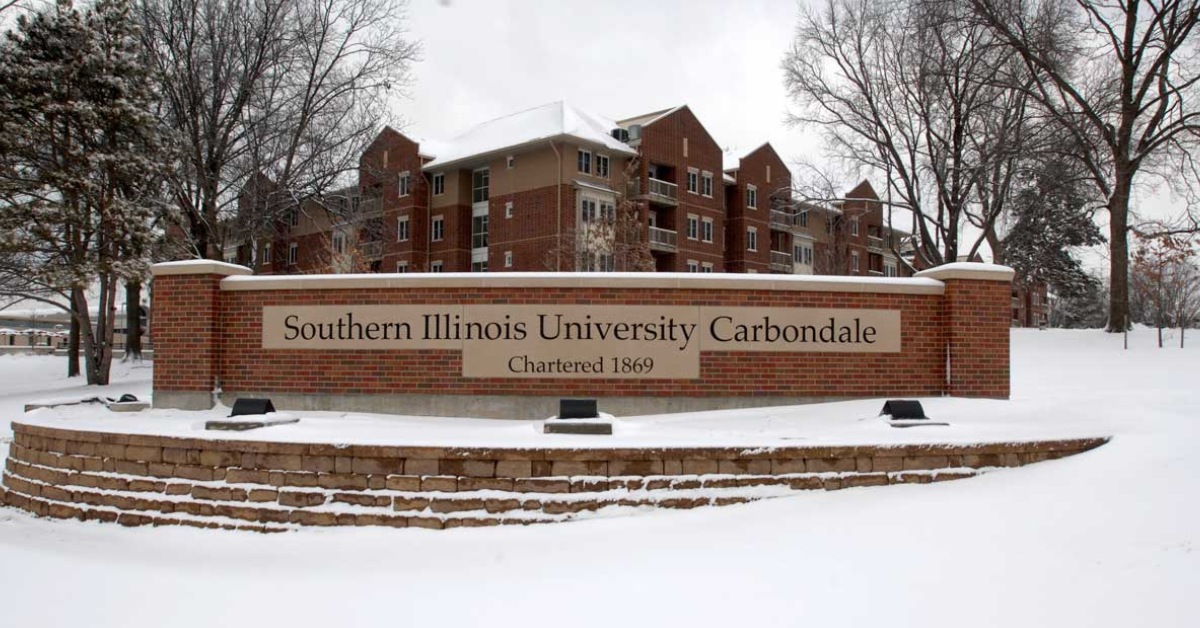
Southern Illinois University School of Law (SIU Law), located in Carbondale, Illinois, was established in 1972 and has been accredited by the American Bar Association (ABA) since 1974. SIU Law focuses on providing practical legal training with a strong emphasis on public interest law and access to justice. The school offers small class sizes and personalized attention, creating a close-knit educational community for its students. The law school was created to provide accessible legal education in the region, focusing strongly on community involvement and practical legal training.
Southern Illinois University School of Law is one of the easier law schools to apply for, with an acceptance rate of 60.47%. The admissions process is accessible, offering opportunities for students not meeting the high thresholds of more competitive law schools. SIU Law is not ranked in the top tiers, but it is well-regarded for its value, affordability, and strong programs in public service. The school has been consistently recognized for minimizing student debt upon graduation, enhancing its appeal to prospective students. SIU Law has been fully accredited by the ABA since 1974, ensuring its graduates sit for the Bar exam in any U.S. state.
Southern Illinois University (SIU) School of Law has an acceptance rate of 60.47%, making it accessible to many applicants. The school’s mission to provide legal education with practical training ensures that many students pursue a legal career. The median LSAT score for admitted students is 149, ranging from 146 to 152. The median GPA is 3.30, with scores ranging between 2.94 and 3.62. Applicants must submit a personal statement, a résumé, official transcripts, and two to four letters of recommendation. Participation in the Credential Assembly Service (CAS) is required to compile all necessary documents for the application process.
The first-time Bar exam passage rate for SIU Law graduates in 2023 was 65.7%, lower than the Illinois state average. SIU Law offers a Juris Doctor (JD) degree along with joint programs like the JD/MBA, allowing for interdisciplinary studies. The law school provides specializations in public interest law, with hands-on clinical programs in areas such as health law, intellectual property, and civil practice. Tuition at SIU Law for the 2024 academic year is $21,555 for in-state and out-of-state students. 75% of full-time students receive an average grant of $5,294, making law school an affordable option for many aspiring lawyers.
How To Choose Which Easiest Law School To Apply For?
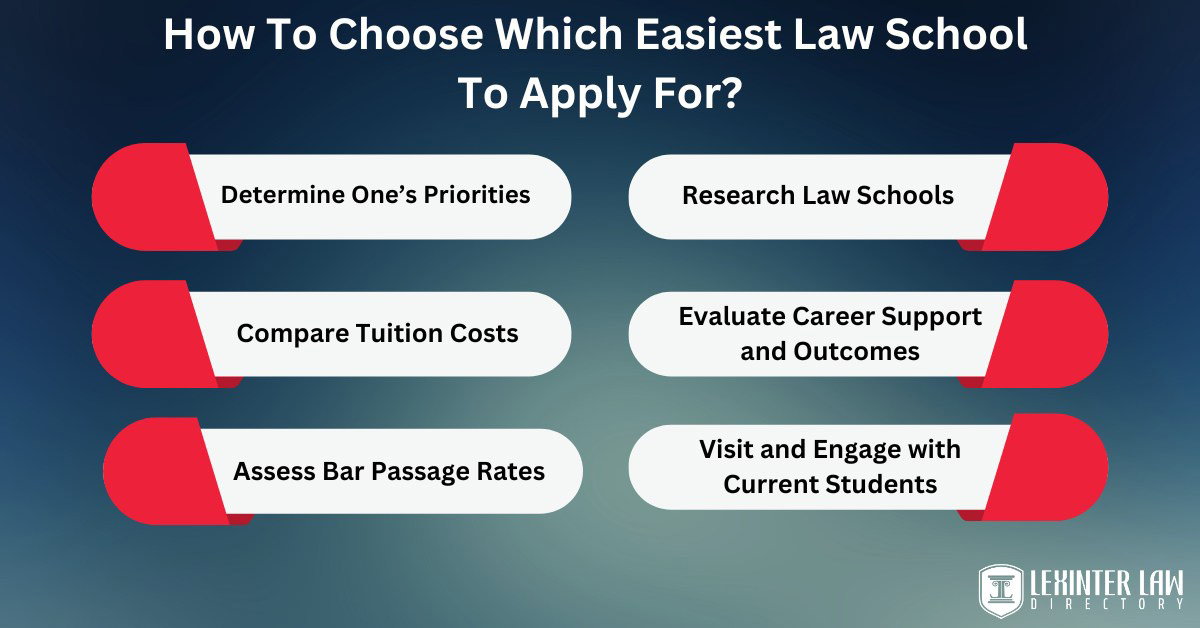
To choose the easiest law school to apply for, follow the 6 steps listed below.
- Determine One’s Priorities. Start by identifying the factors that matter most when selecting a law school. Several students prioritize location, while others focus on tuition costs or specific areas of law. Flexible learning options, such as part-time programs, are important for students with demanding schedules. A clear definition of priorities helps narrow law school choices based on personal and professional needs.
- Research Law Schools. Compile a list of law schools that meet the desired admission criteria. Consider factors such as LSAT scores, GPA requirements, Bar passage rates, and job placement statistics. Evaluating the ease of admission alongside Bar passage rates and employment outcomes provides a clearer picture of the school’s potential value. Researching thoroughly helps identify schools that align with career goals.
- Compare Tuition Costs. Consider the total cost of attending each law school, including tuition, fees, and living expenses. Finding the easiest law school to get into means considering whether scholarships are available to help reduce costs. Several schools offer scholarships, which significantly reduce financial strain. Evaluating the overall affordability of each law school is essential when considering long-term financial commitments. Balancing cost with educational value helps make an informed decision on where to apply.
- Evaluate Career Support and Outcomes. Assess each law school’s career support services, such as job placement rates and alumni network strength. Several schools do not offer robust networks or career connections, which affect long-term job prospects. Understanding how well the school connects students to local legal opportunities provides valuable insights into future career potential. Research career outcomes to ensure compatibility with professional goals.
- Assess Bar Passage Rates. Examine Bar passage rates when considering law schools with easier admission standards. Bar passage rates directly impact the ability to practice law after graduation. Schools offering a balance between accessible admission and strong Bar passage outcomes provide the best opportunities. Understanding Bar passage rates helps avoid future challenges related to professional licensure.
- Visit and Engage with Current Students. Visit law school campuses whenever possible or speak to current students and faculty. Interacting with individuals from the institution provides valuable insights into the school’s culture and support systems. Gathering first-hand feedback helps determine whether the school meets personal preferences and professional goals. A deeper understanding of the environment significantly influences the final decision.
What Are The Requirements For Applying To Law School?
The requirements for applying to law school include a Bachelor’s degree, standardized test scores, transcripts, letters of recommendation, a personal statement, and a resume. A Bachelor’s degree from an accredited institution is required, though the degree is in any field. Applicants must submit either an LSAT or GRE score, with most law schools traditionally favoring the LSAT. The LSAT assesses skills like logical reasoning, reading comprehension, and analytical thinking, with scores ranging from 120 to 180. Transcripts from undergraduate studies are necessary, as law schools consider GPA and academic rigor. Trends such as improvement in later years are taken into account. Submitting letters of recommendation from professors or employers strengthens the application, as they provide a professional or academic perspective on the applicant’s capabilities.
A personal statement is essential for the application, allowing candidates to explain their motivations for pursuing a legal career and highlight any relevant experiences. The personal statement is an opportunity to address any weaknesses in the application. Applicants must submit a professional resume outlining work experience, leadership roles, and extracurricular activities, showcasing their ability to manage multiple responsibilities. Law schools require candidates to use the Credential Assembly Service (CAS) through the Law School Admission Council, which compiles test scores, transcripts, and letters of recommendation. Fulfilling the requirements for applying in law school involves attention to detail and thorough preparation, ensuring every aspect of the application is strong.
What Is The Average GPA For Law Schools?
The average GPA for law school is between 3.5 to 3.7. The range represents the general expectation for most ABA-accredited institutions. Top-tier law schools, such as Harvard, Yale, and Stanford, have significantly higher average GPA requirements, generally requiring applicants to have a GPA of around 3.86 or higher to be considered competitive. Schools within the top 20 law programs set their minimum GPA expectations closer to 3.8 or 3.9, reflecting their demand for academically strong candidates. Lower-ranked law schools are more flexible with their GPA requirements, accepting students with GPAs near 3.0, especially when other parts of the application, such as the LSAT score, are strong. A GPA below 3.0 makes it significantly harder to secure admission, particularly to more competitive institutions. Mid-tier or lower-ranked law schools still offer opportunities for applicants with lower GPAs if other application components, like personal statements or relevant work experience, are compelling. Law schools consider the overall strength of the applicant’s profile, allowing individuals with lower GPAs to demonstrate their readiness through well-rounded applications. A GPA of 3.5 or higher is strongly recommended to increase chances of admission across a broad range of law schools.
What Is The Average LSAT Score To Get Into Law Schools With Easy Admission?
The average LSAT score to get into law schools with easy admission falls between 145 and 150, depending on the institution. Law schools that don’t require LSAT scores, such as institutions accepting GRE scores, have further expanded accessibility. Schools like North Carolina Central University School of Law and Appalachian School of Law admit students with scores starting as low as 145. The institutions emphasize accessibility, focusing on a holistic admissions process that considers personal background, experiences, and professional potential. Law schools with easier admission policies maintain lower average LSAT scores, allowing more students from diverse academic and personal backgrounds the opportunity to pursue legal education.
Gaining admission to some law schools without taking the LSAT is possible through pathways such as the GRE. Thomas Jefferson School of Law is recognized as one of the easiest law schools to apply to without the LSAT. The law school provides flexibility by allowing applicants to submit GRE scores as an alternative to the LSAT. Prestigious institutions, including Harvard and Stanford, have adopted the alternative for greater flexibility. The LSAT remains the preferred exam for most schools, particularly for applicants aiming to keep a broad range of options, even though alternatives exist. Law schools that accept low LSAT scores still use the test to assess readiness, and students who take the LSAT have more options in terms of school selection. GRE-based admissions exist, but the LSAT still holds importance in maximizing school choices.
What Are The Benefits Of Getting Into Law School With Easy Admission?

The benefits of getting into law school with easy admission are listed below.
- Accessibility: Law schools with easier admission standards provide opportunities for students with diverse academic backgrounds. Law schools accept lower LSAT scores and GPAs, allowing a more inclusive environment. Admission accessibility enables individuals from underrepresented groups to pursue legal careers. Diverse perspectives enrich the legal field. Flexible part-time and evening programs accommodate working students, ensuring legal education remains accessible to various lifestyles.
- Reduced Stress: The pressure to achieve high scores on the LSAT or maintain a stellar GPA is reduced. Schools with lenient admission criteria allow students to focus on long-term career goals. Reduced academic pressure promotes a balance between personal well-being and academic achievement. Law schools with easier admissions provide a supportive environment for students seeking less stressful paths into legal education.
- Quick Enrollment: Law schools with more lenient admission standards have a streamlined admissions process. Fast admissions decisions allow students to secure a spot quickly and start legal education sooner. A quick enrollment process enables students to plan their future with greater clarity. Fewer delays in admission reduce uncertainty and allow students to focus on preparing for their law school journey.
- Cost Savings: Law schools with easy admissions tend to have lower tuition rates compared to top-tier institutions. Substantial financial aid packages and scholarships further reduce costs. Lower costs allow students to graduate with less debt. Financial savings provide a budget-friendly alternative for students concerned about the high costs of legal education. Graduates have more financial flexibility after law school.
- Diverse Student Body: Law schools with lenient admission standards attract students from various backgrounds, including non-traditional students and working professionals. A diverse student body fosters inclusivity and promotes cross-cultural understanding. A variety of life experiences enriches the learning environment. Diversity enhances the quality of legal education by exposing students to a broad range of perspectives.
- Focus on Skills Development: Law schools with easier admissions emphasize practical skills over theoretical knowledge. Internship opportunities, externships, and clinical programs ensure students gain hands-on experience. A practical focus prepares students for real-world legal work after graduation. Skills development is critical to success in practicing law, making law schools with the focus highly valuable.
- Networking Opportunities: Smaller law schools with less competitive admissions create a close-knit community where strong relationships are built. Law students benefit from easy access to faculty, peers, and local legal professionals. Networking opportunities within a supportive environment are key to securing internships and mentorships. Building professional connections enhances career prospects after graduation.
What Are The Downsides Of Getting Into Law School With Easy Admission?

The downsides of getting into law school with easy admission are listed below.
- Lower Prestige: Law schools with easier admissions lack the prestige associated with top-tier institutions. Graduate students encounter skepticism in competitive job markets, where prestige and reputation hold significant value. Large firms tend to prioritize candidates from higher-ranked schools, leaving lower-tier graduates at a disadvantage. The absence of a prestigious institution on a resume significantly hinders long-term career advancement and professional opportunities.
- Quality of Education: Law schools with lenient admissions offer a lower quality of education compared to more competitive institutions. Limited resources, less experienced faculty, and outdated curriculums negatively impact the learning experience. Students find themselves underprepared for the Bar exam and real-world legal challenges. A subpar education reduces career opportunities and affects long-term professional success within the legal field.
- Less Competitive Environment: Law schools with easier admissions provide a less competitive academic environment. Students lack the motivation to excel without the challenges found in higher-ranked schools. Reduced competition limits skill development, making graduates less prepared for demanding legal careers. A less rigorous academic atmosphere affects students’ ability to perform well in high-stakes legal environments after graduation.
- Limited Networking Opportunities: Law schools with easier admissions offer fewer networking opportunities than prestigious institutions. Students have limited access to connections with top firms, judges, or influential alumni. Reduced networking opportunities hinder students from securing internships, mentorships, or career advancements. Graduates find it easier to advance their careers in competitive legal markets with strong professional networks.
- Fewer Scholarships: Law schools with lenient admission standards offer fewer merit-based scholarships than top-tier institutions. Students face higher out-of-pocket expenses and rely more heavily on student loans. Fewer financial aid opportunities increase the financial burden on students, making legal education more expensive. Graduating with substantial debt limits early career flexibility and slow long-term financial stability for law graduates.
- Bar Passage Rates: Law schools with lower admission standards tend to have lower Bar passage rates compared to more competitive institutions. Graduates from the schools struggle to pass the Bar exam, an essential step for practicing law. Poor Bar passage rates reflect the school’s inability to prepare students adequately. The challenge of passing the Bar impacts graduates’ ability to secure legal positions and diminishes future career prospects.
- Job Market Challenges: Graduates from lower-ranked law schools face tougher competition in the job market. Employers, particularly top law firms, prioritize candidates from prestigious institutions. Graduates from schools with easier admissions struggle to secure high-paying or influential positions. Job market challenges significantly slow career progression and limit opportunities for long-term success in the legal profession.
How Hard Is It To Get Into Law School?
It is very tough but not insurmountable to get into law school. Getting into law school can vary in difficulty depending on several factors, including the institution’s ranking, acceptance rates, LSAT scores, GPA requirements, and overall applicant pool competitiveness. The average acceptance rate across U.S. law schools is around 41%, meaning that less than half of the applicants are admitted. Top-tier law schools like Yale, Stanford, and Harvard have much lower acceptance rates, ranging from 4% to 13%, making the schools extremely competitive. Yale Law School, with an acceptance rate of 5.5%, a median LSAT score of 173, and a GPA of 3.93, reflects the high academic standards required for admission.
Applicants need to focus on academic performance and LSAT scores to improve their chances of getting accepted into law school. Several top law schools have median LSAT scores ranging between 160 and 175 and expect GPAs near 3.9. Strong academic credentials play a crucial role in the admissions process, but other factors are equally important. Personal statements, letters of recommendation, and tailored essays demonstrating why an applicant is a good fit for the school significantly impact the decision-making process. The level of difficulty in gaining admission varies by institution. Several law schools, like Creighton University School of Law, have higher acceptance rates of 71.36%, making them less competitive. Lower-ranked law schools have more accessible admissions, but the rigor of their curricula and Bar exam pass rates are comparable to more selective institutions. Thorough preparation, strong academic credentials, and a compelling application make gaining admission to law school attainable, even for competitive programs.
Are The Easiest Law Schools To Apply For Cheaper?
No, the easiest law schools to apply for are not necessarily cheaper. Several law schools with higher acceptance rates offer affordable tuition, whereas others charge significantly higher tuition fees. Southern University Law Center offers an easy admissions process with an acceptance rate of 53.46% and affordable in-state tuition at $17,434. The University of North Dakota (UND) has a 62% acceptance rate and an in-state tuition of $17,396, making it cost-effective for residents.
The other easier-to-enter schools such as Creighton University School of Law have a 71.36% acceptance rate but charge significantly more, with annual tuition at $51,430. Willamette University charges $53,994 despite having a relatively high acceptance rate of 69.34%. Tuition rates for easier-to-enter law schools vary widely, depending on whether the institution is public or private, as well as geographic location. Public law schools are more affordable, especially for in-state residents, whereas private schools have higher costs regardless of their admission standards.
What Are The Hardest Law Schools To Get Into?
The 3 hardest law schools to get into are listed below.
- Harvard Law School: Harvard Law School ranks as one of the hardest law schools to enter, with an acceptance rate of around 9.5%. Applicants need an LSAT score of nearly 174 and a GPA of 3.93 to be competitive. Harvard focuses on academic excellence, leadership, and public service, valuing applicants with significant achievements. The school’s global prestige makes Harvard one of the most selective institutions for aspiring lawyers.
- Yale Law School: Yale Law School is regarded as the most selective law school in the United States, with an acceptance rate of approximately 5.5%. Being one of the hardest law schools to get into, admitted students usually have an LSAT score of 173 and a GPA of 3.93. Yale emphasizes intellectual curiosity, leadership potential, and academic excellence. The school seeks applicants who demonstrate an extraordinary ability to think critically and solve complex legal problems while showing a passion for public service.
- Stanford Law School: Stanford Law School remains highly competitive, with an acceptance rate of around 7%. Applicants need an LSAT score of nearly 171 and a GPA of 3.93. Stanford values diversity and considers academic and extracurricular achievements in its admissions decisions. The school looks for well-rounded individuals with intellectual capability and a commitment to contributing positively to society, making it one of the hardest law schools to enter.
How Can Lexinter Help You Find Nearby Lawyers?
Lexinter can help you find nearby lawyers by allowing users to search by location; the platform connects individuals with lawyers in their city, state, or region. The intuitive search filters narrow down results based on legal categories, making it easy to locate specialized attorneys. Lexinter’s premium listings provide comprehensive information, including firm names, contact details, credentials, and links to online profiles. The functionality ensures users find relevant attorneys, whether for criminal defense, estate planning, or divorce proceedings. The ease of access to local attorneys with specific expertise increases convenience and confidence in selecting legal representation.Lexinter is a high-authority online law directory designed to connect individuals needing legal services with top attorneys. Millions of people visit Lexinter every year to find legal help across various practice areas. The platform provides a comprehensive directory of attorneys and law firms, listing firm names, contact information, credentials, and business profiles. Lexinter allows users to search by location and legal category, making it easy to find nearby attorneys. The platform’s premium listings offer additional features, such as links to firms’ Google My Business profiles, social media, and websites, helping clients schedule consultations quickly. Lexinter’s intuitive interface makes the search process seamless for users needing prompt legal assistance.

